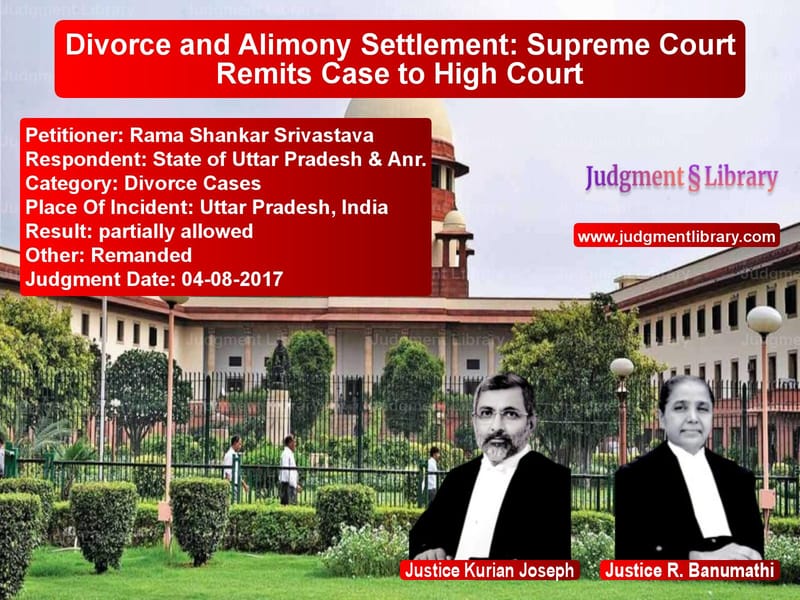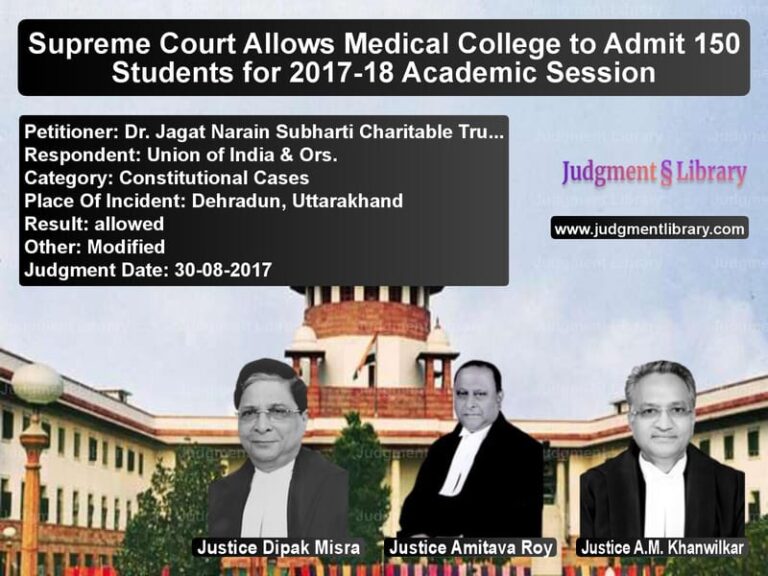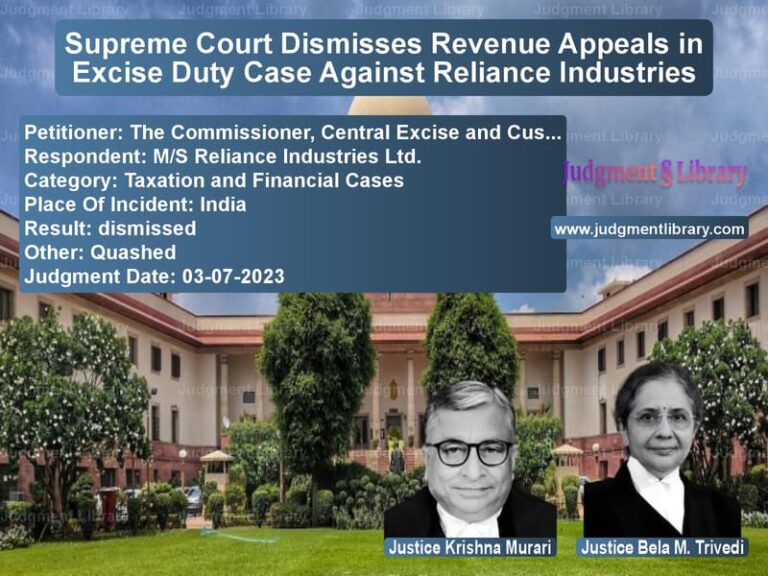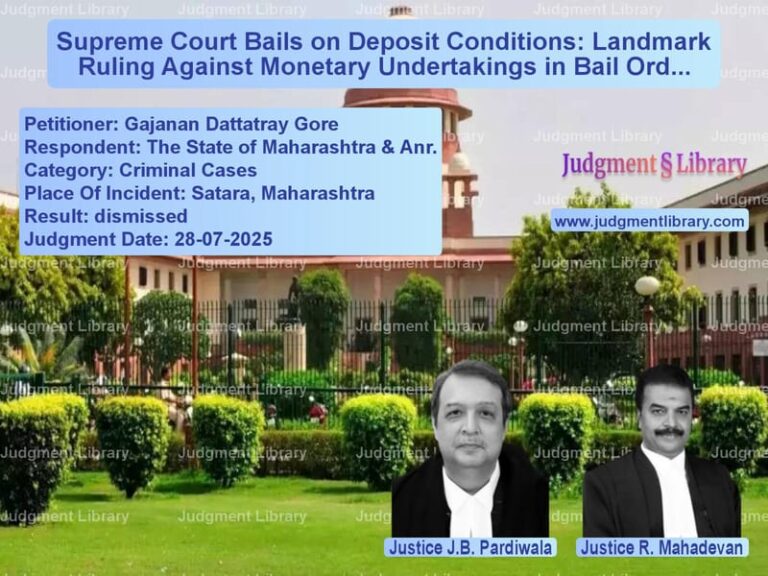Divorce and Alimony Settlement: Supreme Court Remits Case to High Court
The case of Rama Shankar Srivastava vs. State of Uttar Pradesh & Anr. is a significant ruling by the Supreme Court of India concerning divorce and permanent alimony. The dispute revolved around maintenance claims made by the appellant’s wife, leading to prolonged litigation. The Supreme Court, recognizing the aged and ailing condition of the appellant, directed the High Court of Allahabad (Lucknow Bench) to finalize the settlement and grant divorce.
The ruling highlights the importance of amicable settlements in matrimonial disputes, ensuring that both parties receive fair treatment while considering their financial and health conditions.
Background of the Case
The appellant, Rama Shankar Srivastava, and his wife had been living separately since 1994. A legal dispute arose regarding maintenance payments, leading to litigation in the High Court of Allahabad. The appellant, citing his poor health and advanced age, sought a reasonable one-time settlement to resolve the dispute permanently.
On 03.05.2017, the Supreme Court issued an interim order directing the appellant to pay Rs. 50,000 to his wife within a month. The Court also expressed hope that the dispute could be settled amicably.
During a subsequent hearing on 13.07.2017, the respondent’s counsel conveyed that the appellant’s wife was open to a one-time settlement. However, the respondent was not present, necessitating further discussions.
On 04.08.2017, the Supreme Court, after considering the appellant’s health and financial status, remitted the matter to the Lucknow Bench of the Allahabad High Court to finalize the settlement and divorce proceedings.
Key Legal Issues
- Whether the appellant’s financial and health conditions justified a one-time alimony settlement.
- Whether the appellant’s wife was entitled to higher maintenance.
- Whether the High Court was better positioned to facilitate the final settlement.
- Whether the case should be remitted for formal divorce proceedings.
Arguments by the Petitioner (Rama Shankar Srivastava)
The petitioner, represented by counsel, argued that:
- He had been separated from his wife for over two decades, and continuing the dispute was unnecessary.
- He was financially constrained and unable to pay a large sum as alimony.
- He had already paid Rs. 50,000 as per the Supreme Court’s direction.
- He was willing to pay an additional Rs. 2.5 lakhs as a final settlement.
- The matter should be concluded to prevent further litigation.
Arguments by the Respondent (Wife)
The respondent, represented by counsel, countered:
- She was open to a one-time settlement but sought a higher amount.
- Her financial needs required a more substantial alimony payment.
- The settlement should be fair and sufficient to sustain her future expenses.
Supreme Court’s Judgment
The Supreme Court, in a judgment delivered by Justice Kurian Joseph and Justice R. Banumathi, remitted the case to the High Court for finalizing the settlement and divorce.
1. Consideration of Appellant’s Health and Age
The Court noted that the appellant was aged and ailing, making prolonged litigation impractical:
“The appellant is aged and no longer in service. The one-time settlement should be fair but reasonable, considering his financial capacity.”
2. Remitting the Case to the High Court
The Court ruled that the High Court was better positioned to finalize the settlement:
“In the absence of the respondent, we are not in a position to decide the final amount. The High Court is directed to facilitate the settlement and grant divorce.”
3. Directions for Final Settlement
The Supreme Court directed both parties to appear before the High Court on 01.09.2017 to conclude the matter:
“The parties will appear before the Lucknow Bench of the High Court on 01.09.2017 for finalization of the settlement and completion of divorce formalities.”
Key Takeaways from the Judgment
- One-time settlements are preferable in prolonged disputes: The Court encouraged amicable resolutions to avoid unnecessary litigation.
- Health and financial conditions influence alimony decisions: The Court considered the appellant’s age and financial capacity.
- High Courts can better facilitate settlements: The Supreme Court remitted the case to ensure a fair and efficient resolution.
- Final settlements prevent repeated litigation: The ruling aimed to bring closure to the long-standing dispute.
Impact of the Judgment
This ruling has significant implications for matrimonial disputes:
- Encourages parties to consider one-time settlements for quicker resolutions.
- Ensures fairness in alimony decisions by factoring in financial conditions.
- Provides a clear process for resolving long-pending matrimonial cases.
Conclusion
The Supreme Court’s ruling in Rama Shankar Srivastava vs. State of Uttar Pradesh & Anr. highlights the importance of final settlements in matrimonial disputes. By directing the High Court to facilitate the resolution, the judgment ensures a fair and practical approach to divorce and alimony cases.
This ruling serves as a precedent for future cases, promoting efficient resolution mechanisms and preventing prolonged litigation in maintenance and divorce matters.
Don’t miss out on the full details! Download the complete judgment in PDF format below and gain valuable insights instantly!
Download Judgment: Rama Shankar Srivast vs State of Uttar Prade Supreme Court of India Judgment Dated 04-08-2017.pdf
Direct Downlaod Judgment: Direct downlaod this Judgment
See all petitions in Alimony and Maintenance
See all petitions in Mutual Consent Divorce
See all petitions in Property Division in Divorce Cases
See all petitions in Judgment by Kurian Joseph
See all petitions in Judgment by R. Banumathi
See all petitions in partially allowed
See all petitions in Remanded
See all petitions in supreme court of India judgments August 2017
See all petitions in 2017 judgments
See all posts in Divorce Cases Category
See all allowed petitions in Divorce Cases Category
See all Dismissed petitions in Divorce Cases Category
See all partially allowed petitions in Divorce Cases Category







